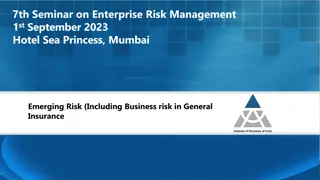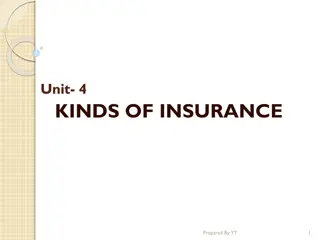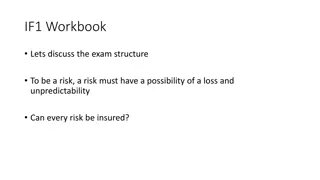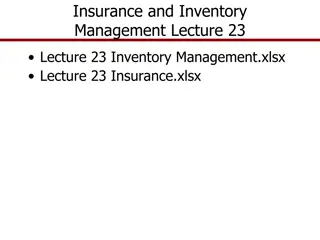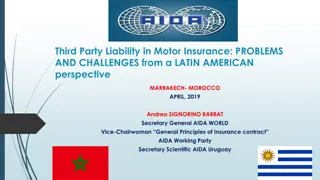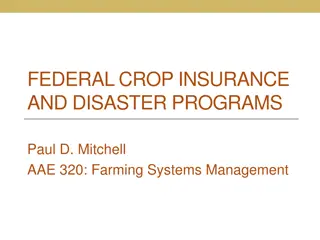
Understanding Insurance Intermediaries: Definition, Authority, and Rights
Learn about insurance intermediaries, their definition as per IRDA Act, the types of authority they have including express, implied, and apparent authority, as well as their rights and duties. Discover the penalties for working without a license in the insurance industry.
Download Presentation

Please find below an Image/Link to download the presentation.
The content on the website is provided AS IS for your information and personal use only. It may not be sold, licensed, or shared on other websites without obtaining consent from the author. If you encounter any issues during the download, it is possible that the publisher has removed the file from their server.
You are allowed to download the files provided on this website for personal or commercial use, subject to the condition that they are used lawfully. All files are the property of their respective owners.
The content on the website is provided AS IS for your information and personal use only. It may not be sold, licensed, or shared on other websites without obtaining consent from the author.
E N D
Presentation Transcript
Subject Class Session Topic College : Fundamental of Insurance : B.com (Final) : VI : Insurance Intermediaries : I.B (PG) College , Panipat Affiliated to Kurukshetra University , Kurukshetra Prepared By : Prof. Lata Arora
INSURANCE INTERMEDIARIES Definition :- As per section 2(f) of IRDA Act,1999 : Intermediary or insurance intermediary include brokers, insurance consultants, surveyors and loss assessor. How Agency arises : 1. By Agreement 2. By Ratification
Types of Authority There are three types of authority: express, implied, and apparent Actual authority includes express authority and implied authority Express authority is the authority which the principal has expressly given to the agent whether orally or in writing. Implied authority (sometimes described as usual authority) is the authority of an agent to do acts which are reasonably incidental to and necessary for the effective performance of his duties.
Apparent or ostensible authority An agent is said to have apparent or ostensible (not actual) authority if 1. the principal has made a representation (whether by words or conduct) to the third party to the effect that the agent has the authority to act for him although the agent does not in fact have such authority 2. The agent has only the appearance of authority, but no actual authority to act on behalf of the principal
Rights of an Agent Right of retention Right of lien Right to compensate Right to remuneration
Duties owned by agent to principal No secret profit No delegation of authority Deal only on behalf of principal name To act with in the Pre-defined limit Maintain confidentiality of information & database
Penalty for working without license If person act as an agent without holding license , he/she will be liable to pay fine which may extend to Rs.500/- If a company/firm act without license , then each partner, director or any other officer who is knowingly a party of such contravention shall be liable to pay fine of an amount which may extend to Rs.5000/-
Validity of license A license issue by IRDA shall valid for a period of 3 years from the date of issue. Duplicate License IRDA may issue a duplicate license if license is 1. lost 2. Destroy
Documents Required to Be submit with IRDA 1 Proof of Highest Qualification 2.Proof of Identity 3.Proof of Age 4.Proof of Address 5.Prescribed Fees
Disqualification IRDA may disqualified any person to act as an agent on the following grounds:- 1. If the person is a minor 2. He does not possess requisite qualification 3. He is found to be unsound mind as per court 4. He violates the code of conduct as prescribed by IRDA 5. He has been found guilty of any fraud/forgery . 6. He attempts to commits any offence which is prohibited by law .







